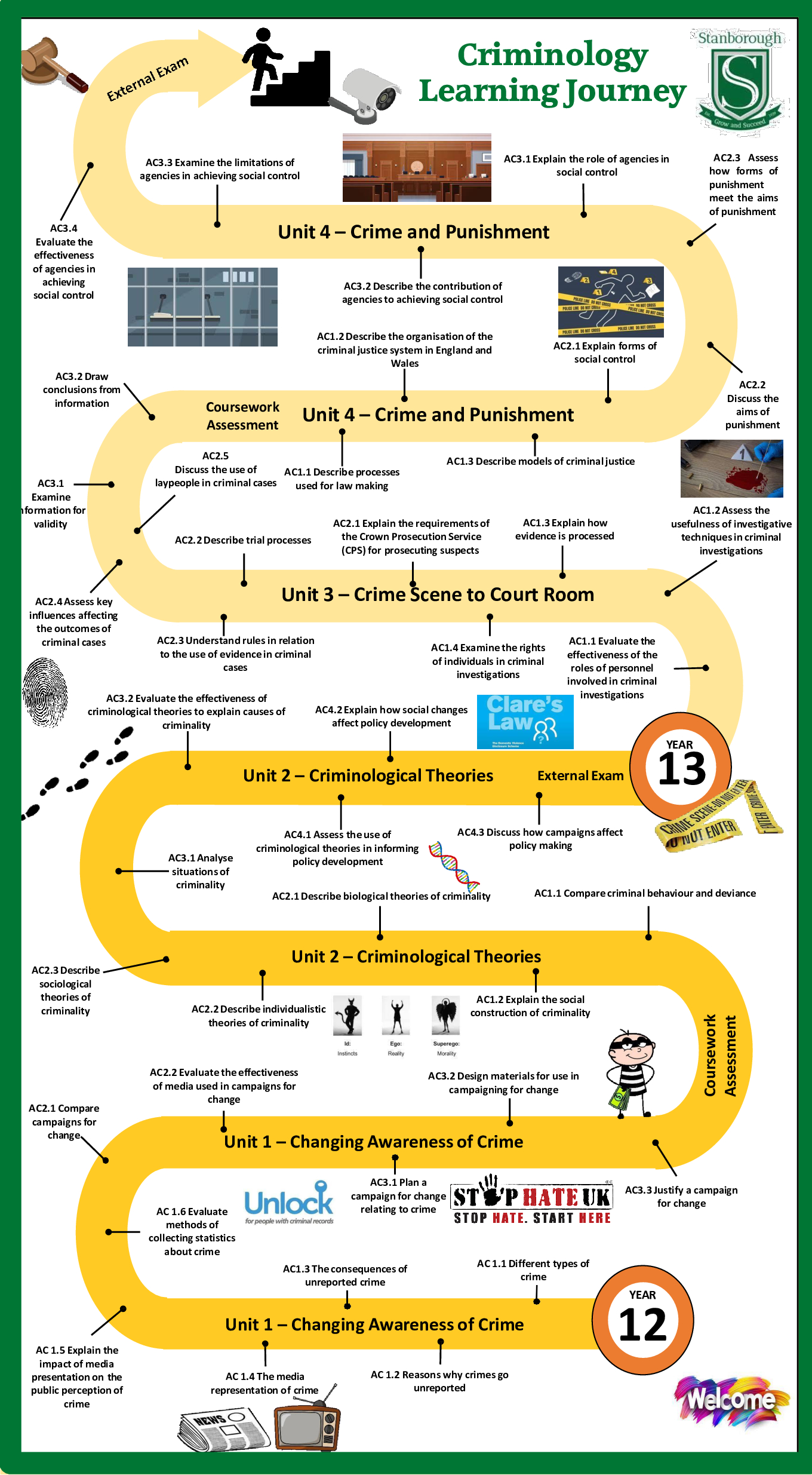Criminology
WJEC Level 3 Diploma in Criminology is a qualification with elements of Psychology, Law and Sociology that also complements studies in Humanities and Media.
This is an Applied General qualification, which means it is designed primarily to support learners progressing to university. It has been designed to offer exciting and interesting experiences that focus learning for 16- to 19-year-old learners and adult learners through applied learning, i.e. through the acquisition of knowledge and understanding in purposeful contexts linked to the criminal justice system. The qualification would support learners’ progression from any study at Level 2, particularly GCSEs in Sociology, Law, Psychology, Citizenship, History and Humanities.
Head of Department: Ms H Gothard
Email: hgothard@stanborough.herts.sch.uk
WJEC Level 3 Diploma in Criminology (2-year course)
| Unit number | Entry code | Unit title | Assessment | GLH | |
|---|---|---|---|---|---|
| 1 | Changing Awareness of Crime | Mandatory | Internal | 90 | |
| 2 | Criminological Theories | Mandatory | External | 90 | |
| 3 | Crime Scene to Courtroom | Mandatory | Internal | 90 | |
| 4 | Crime and Punishment | Mandatory | External | 90 |
Learners must complete ALL units.
The first mandatory unit will enable the learner to demonstrate understanding of different types of crime, influences on perceptions of crime and why some crimes are unreported. This will be tested through a controlled assessment during Year 12 of the course.
The second mandatory unit will allow learners to gain an understanding of why people commit crime, drawing on what they have learned in Unit 1. This will be tested at the end of Year 12 through a 90-minute external exam.
The third mandatory unit will provide an understanding of the criminal justice system from the moment a crime has been identified to the verdict. Learners will develop the understanding and skills needed to examine information in order to review the justice of verdicts in criminal cases. Learners will complete a controlled assessment relating to this unit during Year 13 of their studies.
In the final mandatory unit, learners will apply their understanding of the awareness of criminality, criminological theories and the process of bringing an accused to court in order to evaluate the effectiveness of social control to deliver criminal justice policy. This will be assessed through a 90-minute external exam at the end of Year 13.
Each unit within the qualification has an applied purpose which acts as a focus for the learning in the unit. The applied purpose demands learning related to authentic case studies. It also requires learners to consider how the use and application of their learning impacts on themselves, other individuals, employers, society and the environment.
The applied purpose will also allow learners to learn in such a way that they develop:
- skills required for independent learning and development
- a range of generic and transferable skills
- the ability to solve problems
- the skills of project based research, development and presentation
- the fundamental ability to work alongside other professionals, in a professional environment
- the ability to apply learning in vocational contexts
For further information regarding the Criminology course please contact a member of the Criminology department.
Ms H Gothard – Head of Department – hgothard@stanborough.herts.sch.uk
How can I support my child in this subject?
The best way to support your child in Criminology is to ensure that classwork is being consolidated at home through independent revision and the completion of homework tasks. Talk to your child about what they are learning in class and provide opportunities to discuss interesting concepts. Wider reading for the subject is also encouraged, for example reading newspaper articles and linking the content to Criminology. Watching relevant documentaries with your child is helpful to allow them to discuss key concepts and improve their understanding. Ensure your child has a copy of the course textbook/revision guide and a well-stocked pencil case in line with Stanborough school expectations.
Celebrating successes in this subject
Teachers use reward points every lesson to recognise the effort, attainment and presentation of students. Specific students in each year group are also recognised when they are given the subject prizes in the celebration of achievements evening. Outstanding work is displayed in the classroom and around the school.
Extra-Curricular Activities and Visits
As this is the first year we are running this course, we are currently exploring opportunities here.





